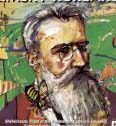|
|
“The
Golden Cockerel, 1914” (or “Le Coq d’Or”) was the last opera of Nicolay
Rimsky-Korsakoff (1844-1908). The censor refused to sanction its performance
during the composer’s lifetime and his difficulties with the authorities in
this matter are supposed to have hastened his death. Korsakov was a keen
collector of Russian peasant songs and had used folk melodies in his music. The
opera, in three acts, is composed to a libretto by V. Bielsky, based upon a
well-known poem by Pushkin.
Act
III, and Epilogue
Where
is the Tsarina?
Disappeared
as if she never existed.
Did
the Tsar cry out?
No.
He’s dead. If this isn’t all a dream that is.
The
Tsar is dead.
The
good man has been murdered.
The
happy Tsar, the carefree Tsar,
the
eternally unforgotten Tsar!
Ruler
of all rulers!
How
wise he was.
With
his hands in his lap, he ruled his people lying down.
However,
when the Tsar was angry, he could he like a heavenly storm.
He
would strike at random. Everyone was in danger.
When
the cloud had passed and the heavy air had cleared, our golden Tsar would
radiate as if nothing had happened.
What
will the new morning bring us?
What
will we do without the Tsar?
# # #
So
this is the end of the fairy tale.
But
the bloody resolution, while it is burdensome, shouldn’t worry you.
I
and the Tsarina were the only real ones here.
The
others were fantasies, dreams, spirits and mere illusions!
